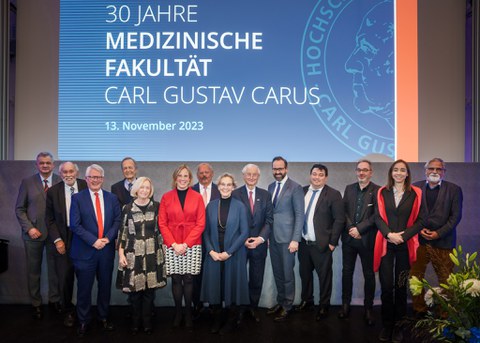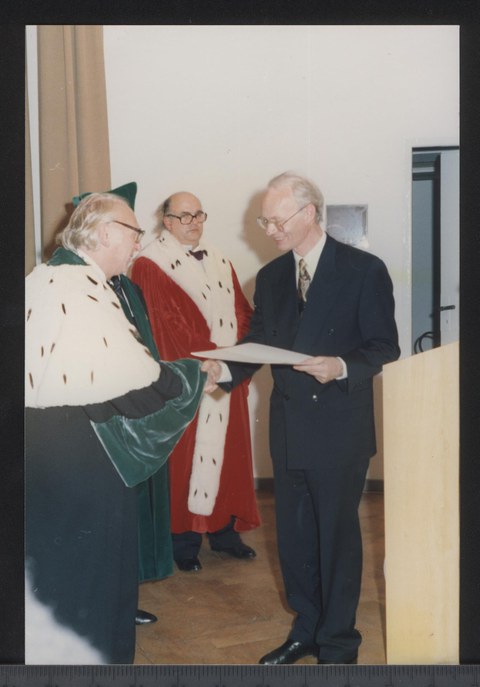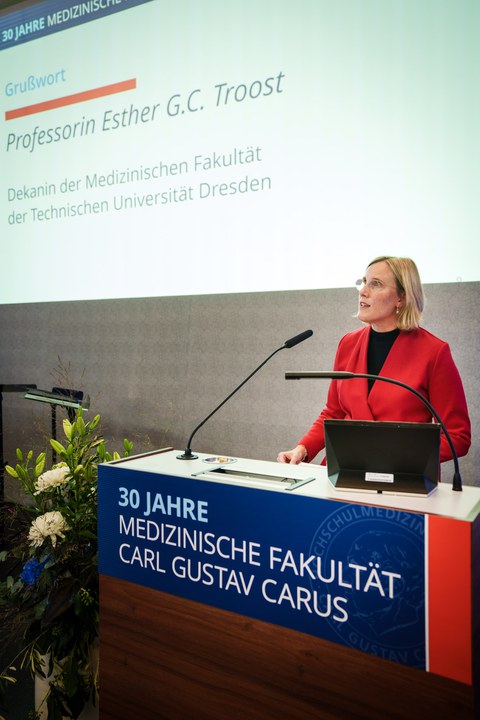Nov 13, 2023
30 years of Faculty of Medicine at TU Dresden

The dignitaries at the 30th anniversary ceremony of the Faculty of Medicine Dresden - guests and companions came from all over Germany.
Innovative teaching, a steadily growing research volume, and an increase in third-party funding are all evidence of a veritable success story.
- A festive ceremony will honor the development of the faculty into an excellent institution for education and research.
- An exhibition at the Dean's Office on the occasion of the anniversary will show "Instruments of Excellence in Medicine".

The handover of the foundation charter in autumn 1993: (from left to right) Prof. Dr Günther Landgraf (Rector of TU Dresden), Prof. Dr Karl-August Bushe (Founding Dean of the Faculty of Medicine, hidden); Prof. Dr Otto Bach (Rector of the Carl Gustav Carus Medical Academy) and Prof. Dr Hans Joachim Meyer (Minister of State for Science and Art in Saxony)
The end of October marks the 30th anniversary of the founding of the Carl Gustav Carus Faculty of Medicine at TU Dresden. Its establishment in 1993 was the beginning of a success story. A ceremony on November 13, 2023 will unite physicians, students, alumni, supporters, researchers, as well as guests from politics and partner institutions of the faculty. Germany's youngest Faculty of Medicine looks back on three successful and eventful decades. Innovative teaching, a steadily growing research volume, and an increase in third-party funding confirm the strategies of the founding committee of the time. Today, 2,881 students are enrolled at the Faculty of Medicine, and 1,782 staff are working on research and teaching for the future. In total, 8,583 people are employed in Dresden University Medicine. The faculty raises over EUR 70 million in third-party funding for medical research each year. Along with the Carl Gustav Carus University Hospital Dresden, the faculty forms the Dresden University Medicine and is a pioneer in many disciplines, in digital medicine as well as in future-oriented research and education. Interdisciplinarity is the hallmark of their work – even beyond medicine. The Dresden University Medicine is connected with other TU Dresden departments as well as partners from the Dresden science community and is thus both an important hub for research projects and a major employer in the region.
The success story of the Dresden University Medicine becomes evident in its focus on oncological, metabolic as well as neurological and psychiatric diseases. These pillars are interlinked and strengthened in the long term by cross-sectional areas, including technology development and digital health, as well as prevention and health research. Since its establishment, the Faculty of Medicine has thus been concentrating on focal areas in which the Dresden University Medicine is particularly efficient in both research and patient care, and has been successively expanding these. The aim has always been to ensure that relevant research findings are quickly transferred to patient care so that the patients can benefit from them. The steadily increasing number of patients is crucial in order to use the data to fill translational research with life, in a very practical sense. This research ranges from fundamental to clinical research. An outstanding example are the individual therapies for cancer patients. The particular importance of research at the Dresden location has been strengthened by the involvement of TU Dresden's Faculty of Medicine in currently three German Centers for Health Research. The partner sites of the German Center for Diabetes Research, the German Center for Neurodegenerative Diseases and the German Consortium for Translational Cancer Research are prerequisites for conducting research at an international level in a preclinical and experimental environment.

Prof Esther Troost is Dean of the Faculty of Medicine Dresden
Prof. Esther Troost, Dean of the Faculty of Medicine at TU Dresden: "It is our essential goal to understand cutting-edge research in a way that our knowledge and new findings benefit all patients as quickly as possible. Over the last few decades, we have laid the foundation for physicians to benefit from an infrastructure that enables freedom for their own research in addition to their work with patients. This holds true in particular for the focus on the three major research areas."
Prof. Michael Albrecht, Medical Director at Dresden University Hospital: "The outstanding development of Dresden's University Medicine fills us with pride. We have succeeded in achieving permanent top positions in patient care as well as in research and teaching. The basis for these successes has been a strategy that was designed in the mid-1990s, which is to concentrate on relevant future fields of medicine."
Prof. Ursula Staudinger, Rector of TUD Dresden University of Technology: "This success story is also based on practiced translation. Physicians from the University Hospital work hand in hand with scientists from the Faculty of Medicine and other TU Dresden faculties on a daily basis. This close interaction is what distinguishes the particular expertise of Dresden University Medicine in serving both patients and science, and it is essential for its ongoing development."
Michael Kretschmer, Prime Minister of Saxony: "First-class teaching and excellent research have characterized the Faculty of Medicine at TU Dresden for decades. This success story is due to the commitment and perseverance of the founders in the 1990s. Today, the University Medicine is a lighthouse for innovations, future-oriented research and interdisciplinary work and education."
Sebastian Gemkow, Saxon Minister of Science: "We celebrate this anniversary with many physicians, scientists, all the staff, the administration, nursing staff, and students from a wide range of backgrounds. They are the driving force behind the close collaboration between the Faculty of Medicine and Dresden University Hospital, as well as other institutes and research facilities, so that the latest findings from medical research can be transferred into practice quickly and efficiently."

Prof Johanna Wanka has not only accompanied the work of the Faculty of Medicine as Federal Minister of Science. She came to Dresden for the ceremony and gave the keynote speech.
Cutting-edge medicine at the top of German rankings
In the German University Medicine, Dresden has ranked among the top for a long time. This is also reflected in the third-party funds acquired: In 2022, the sum of this external funding from the federal government, the Free State of Saxony, the European Union, foundations and industry amounted to EUR 77 million. For comparison: In 1993, the year of its founding, the total was DM 6.6 million, i.e. EUR 3.4 million. In 2022, the Faculty of Medicine recorded a total of 898 jobs financed through third-party funds – making the Faculty of Medicine a job engine for the city and the region. A crucial reason for the continued positive development of acquired third-party funding are the faculty's close collaborations with the Center for Regenerative Therapies, the Biotechnology Center, the Max Planck Institute, and the Helmholtz Center Dresden-Rossendorf. The joint projects provide the breeding ground for successful development and were a major factor in TU Dresden's success in the federal government's Excellence Initiative. As the number of staff continues to grow, the Faculty of Medicine and the University Hospital are also major regional and international employers for academics as well as technical and nursing staff. A total of 90 nations work in Dresden University Medicine. The growing number of scientific publications is another sign of quality. The number of articles in scientific journals of national and international relevance rose from 1,670 in 2011 to 2,055 in 2022. The total number of unweighted impact points rose from 5,340 in 2011 to 12,733 in 2022.
Today a prime location for cutting-edge medical research
The founding of the Faculty of Medicine in Dresden was preceded by a fierce battle for the University Medicine location. At the beginning of the 1990s, the German Science and Humanities Council evaluated the performance record and concluded that it was not advisable to continue the Medical Academy. Instead, the clinic was supposed to serve as an academic teaching hospital. In response, the then Minister of Science, Prof. Hans Joachim Meyer, convened a founding commission consisting of members from all over Germany. The concept drawn up finally convinced the German Science and Humanities Council. The founding of the Faculty of Medicine in Dresden was approved in May 1993 and finally put into effect in October. The location now stands for exceptional quality – even beyond the borders of Germany – as the international network demonstrates, for example in the context of collaborations abroad, such as with Harvard University in Cambridge. Today, Dresden University Medicine is one of the top locations in Germany, and is a lighthouse in particular in the defined fields of cancer medicine, diabetology and neurodegenerative diseases. Thanks to comprehensive funding programs, such as the one of the National Center for Tumor Diseases (NCT/UCC), the continued expansion of excellent structures is assured. As such, the NCT/UCC Dresden has been re-certified as an "Oncological Center of Excellence". After 17 years of successful work, an international panel of experts once again attested to the highest level of patient care and research.
Incubator for the next generation
Over the past 30 years, 4,661 doctors and 1,322 dentists have been trained at the Carl Gustav Carus Faculty of Medicine. A total of 6,261 students have successfully completed their studies in Human Medicine, Dentistry, Public Health and Medical Radiation Sciences since the first enrollments in 2003/2004. In order for this success story to continue, promoting young talent in the long term is essential. Therefore, research and teaching are closely dovetailed at the Faculty of Medicine. Scientific findings from current research carried out by members of the faculty are made available in lectures and seminars for doctoral students. A doctoral college fosters particularly talented students with an interest in research. In order to bundle the outstanding successes in the promotion of early-career researchers, the "Dresden School of Clinical Science" was founded in 2019. This overarching structure pools various support services for early-career researchers and creates an optimal environment for prospective researchers in the field of medicine and the associated natural sciences.
Consolidating Excellence in Dresden
With the Else Kröner Fresenius Center (EKFZ) for Digital Health, there has been a new interdisciplinarity between high-tech and medicine on the campus of Dresden University Medicine since 2019. The EKFZ links the outstandingly well-positioned University Medicine with the excellent expertise of TU Dresden. The strong support of early-career researchers and targeted appointments strengthen the areas of artificial intelligence, implants and sensors, regulation and innovation research at the interface of medicine and high-tech. The goal of the Center is to unlock the potential of digitalization in medicine for even better patient care and to link academic, clinical and economic knowledge in the long term. In September 2023, the Else Kröner Fresenius Foundation confirmed an additional EUR 20 million in funding following an appraisal to enable doctors and engineers to expand the work that has already begun.
A key step towards consolidating Excellence at the site is the Center for Metabolic and Immunological Diseases and Therapeutic Technologies Saxony (MITS). Since 2022, the research building has provided space for 100 staff and is directly connected to the Medical Theoretical Center (MTZ) of the Faculty of Medicine. The close integration strengthens the international competitiveness of the Faculty of Medicine and the Dresden University Hospital.
Instruments of excellent medicine
As part of an exhibition, experts will present the latest developments in university medicine in Dresden from November 13, 2023 in the Dean's Office Building, House 40.
- National Center for Tumor Diseases Dresden (NCT/UCC): Prof. Oliver Bruns
- Medical Clinic and Polyclinic III: Collaboration with the Leibniz Institute of Polymer Research Dresden (IPF): Prof. Barbara Ludwig
- BoneLab – Innovative bone research for lifelong mobility: Prof. Martina Rauner
- Else Kröner Fresenius Center for Digital Health: Dr. Nora Martens, Prof. Jakob L. Kather
- OncoRay – National Center for Radiation Research in Oncology: Dr. Toni Kögler
- Saxocell: Living drugs, the Saxon precision therapy cluster: Prof. Frank Buchholz
- Cross-site teaching through digitalization: Marie Willemer, Veronika Satlow
- German Center for Neurodegenerative Diseases (DZNE): Prof. Gerd Kempermann
Media inquiries:
TU Dresden
Press Office
Tel.: 0351 463-32398

